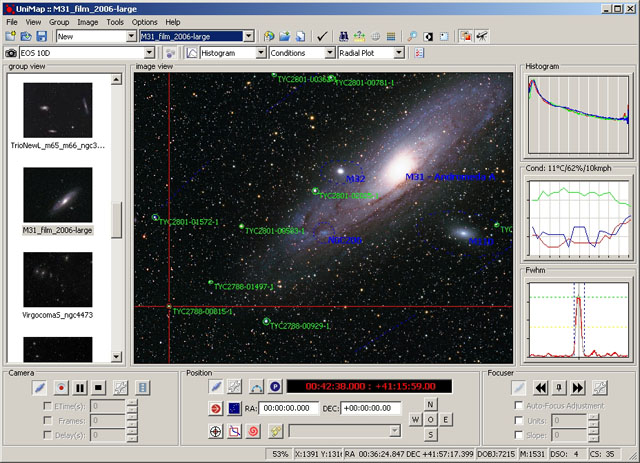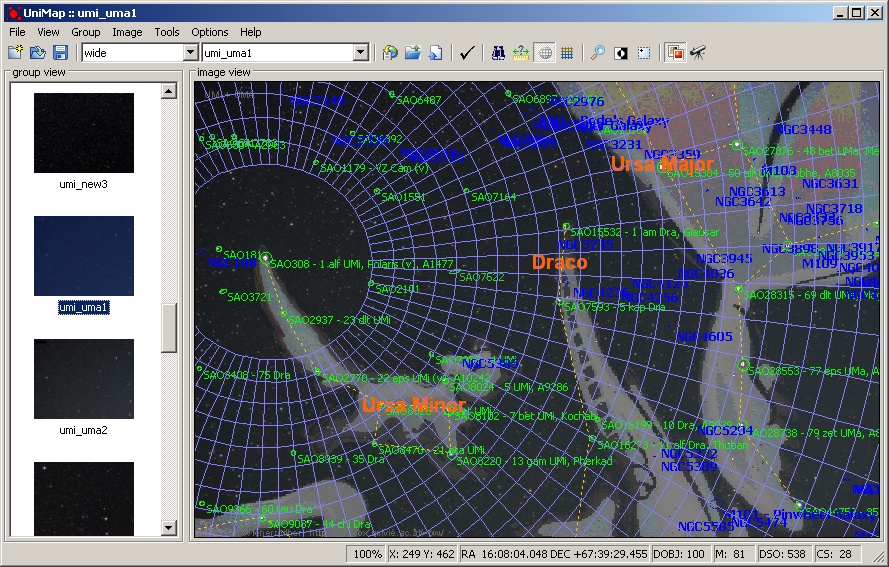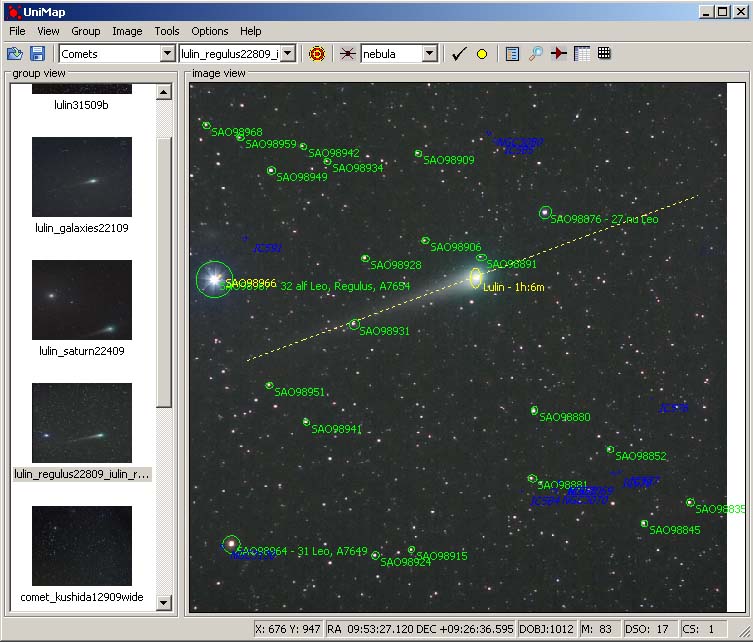- Posts: 2707
- Thank you received: 32
Unimap
- DaveGrennan
- Offline
- IFAS Astronomer of the Year 2010
-

To do serious stuff requires some degree of competancy - and support - and the support is not really there for amateurs. I therefore totally endorse your initiative in providing tools that suport amateurs. However, sometimes it is education that is lacking in the community and not necessarily the tools. Tools (to do almost anything) *are* freely available.
Mark, I would say that if amateurs are willing to put the effort ino gaining the required competencies to do research grade work then (at least in my experience) professionals are more than happy to lend a hand. I think where *some* amateurs fall down is that they often want it 'handed on a plate'. I think this is where the pros draw the line. (and I don't blame them). In my own area of minor planet research, I've found on many occassions some of the pros from the big surveys often offer unsolicited insights or assistance. For example last year, I was asking a question about uncertainty maps for near earth asteroids. One of the big surveys took their main scope off the survey to demonstrate a point under discussion.
I take my hat off to Larry for the excellent work. As an amateur astronomer and a professional programmer, I fully appreciate the incredible amount of work and effort that goes into something like this. In many ways as a programmer you try to take a PHD (Push Here Dummy) approach to developing tools. Whereas this is a lot of effort for the developer, it can sometimes oversimplify a process for the end user leading to a situation where the end user can use the tool but has no idea about the hows and whys of what is actually going on.
Often I meet people who are full of enthusiasm for minor planet research until a point comes where they realise that in fact if can be damned hard work and then they disappear. Or some even don't get that far because they couldn't be bothered to read the documentation.
What I'm taking forever to say is that there is a huge amount an amateur can do if he/she is prepared to put in the effort, but alas many want the gain but no pain.
Larry: I like your idea about catalog refinement, but what I'd *really* love to see is a project where the amateur ends up developing a real skillset and some more detailed background knowledge about what it is they're doing. For example a version of galaxy zoo which enables users to learn why galaxies are the shapes they are. Maybe teaching the user some elements of statistical distributions and then letting the user play with the data and draw some conclusions. Of course many would run a mile from something like this, but thankfully many (just like you guys) would see it for the opportunity it presented and grab it with both hands.
Regards and Clear Skies,
Dave.
J41 - Raheny Observatory.
www.webtreatz.com
Equipment List here
Please Log in or Create an account to join the conversation.
- mjc
- Offline
- Main Sequence
-

- Posts: 470
- Thank you received: 20
I think I know what larry was driving at re: catalogues - the disparate format and information content. What might improve the situation there is XML tagging.
There appears to be some movement in this direction as indicated in this reference
www.adass.org/adass/proceedings/adass99/O9-04/
which might interest Larry. I've read this page and it interests me - I haven't read any further to determine if there's any actual implementations yet.
With regards to your coments re shapes of galaxies and understanding of same, Galaxyzoo recently announced the launch of a new project where users compare simulated galactic collisions and match the best outcomes against actual galaxy formations. I think very closely related to your suggestion.
See: www.galaxyzooblog.org/2009/11/24/galaxy-...ding-cosmic-mergers/
I'm reasured of your comments regarding support you have had from the MPC arena but I feel I have to really trawl hard for information at times. Though I have to say support in the form of access to a lot of professional resources is there but it's been a bit of a slog to determine what I should be looking for (for whatever I might be interested in at the time), then finding it, then understanding it. Though sometimes I think that it is this that I probably enjoy most.
I'm very tempted to get myself an Athens account because I'm frustrated at times when I can only get the abstract of a paper.
Mark
Please Log in or Create an account to join the conversation.
- larrylart
- Topic Author
- Offline
- Proto Star
-

- Posts: 42
- Thank you received: 0
Whereas this is a lot of effort for the developer, it can sometimes oversimplify a process for the end user leading to a situation where the end user can use the tool but has no idea about the hows and whys of what is actually going on.
Well, in the idea I wrote this, for the main purpose of expanding the knowledge of the amateur astronomer about what is in their picture I am not sure that is so important they know about the maths behind star matching process
DaveGrennan wrote:
Larry: I like your idea about catalog refinement, but what I'd *really* love to see is a project where the amateur ends up developing a real skillset and some more detailed background knowledge about what it is they're doing.
Yes, I know you mean. I was disappointed as well about how “bold” that galaxyzoo task was – somehow when I heard of them I expected something more orientated towards the amateur astronomers community rather then general public… Probably the best approach will be a “game” where the user can acquire small bits of information in steps (nothing to hard at once to scare them away) by following nicely done interactive tutorials and by this allow them to advance hierarchically - but this will require some resources – but then again we are a small army of amateur astronomers
mjc wrote:
Galaxyzoo recently announced the launch of a new project where users compare simulated galactic collisions and match the best outcomes against actual galaxy formations.
Yes, this projects is slightly better then the initial one. Yet they hold on the idea of being open to general public only – I think they should provide an advanced interface where you can customize your simulations more precisely by modifying all kind of values/parameters of your simulation along with a good tutorial as what every parameter stands for and what impact might have on your simulation. Also, I think these projects should be more open as to provide access to the data resulted from analysis and in other aspects as well.
mjc wrote:
I think I know what larry was driving at re: catalogues - the disparate format and information content. What might improve the situation there is XML tagging.
Yes, this will help, but there is also a lack of standard in the way measurements are presented – like for position in decimal and sexagesimal or the units used for various measurement or the way magnitude is expressed in various catalogs or naming conventions. I know that in most cases there is a reason behind the way that catalog was built but I think having a better standard will ease the task of centralizing all these thousands of catalogs with various measurements or verify/compare them.
Larry
_______
larryo.org
Please Log in or Create an account to join the conversation.
- larrylart
- Topic Author
- Offline
- Proto Star
-

- Posts: 42
- Thank you received: 0
You can download and test the very first pre-alpha release from here:
larryo.org/work/information/unimap/download.html
I know there are still bugs and room for of improvements, optimization, etc. "Unfortunately" I have built this application so big for so little time I’ve got that I should probably be focusing on getting the a core functionality working right and here any suggestions and ideas will really help.
Larry
_______
larryo.org
Please Log in or Create an account to join the conversation.
- larrylart
- Topic Author
- Offline
- Proto Star
-

- Posts: 42
- Thank you received: 0
Larry
_______
larryo.org
Please Log in or Create an account to join the conversation.
- larrylart
- Topic Author
- Offline
- Proto Star
-

- Posts: 42
- Thank you received: 0
_______
larryo.org
Please Log in or Create an account to join the conversation.






